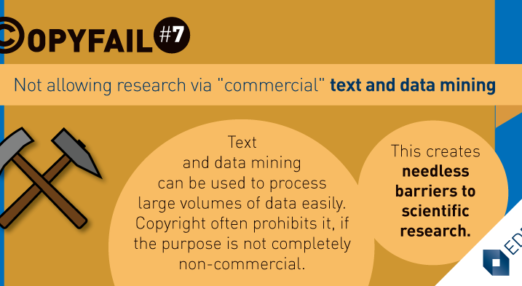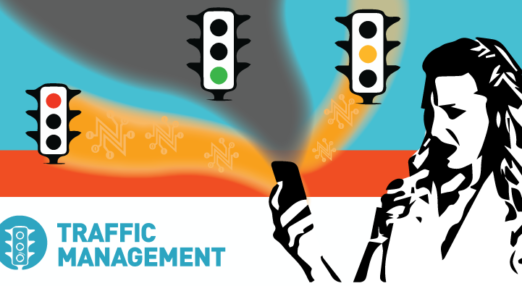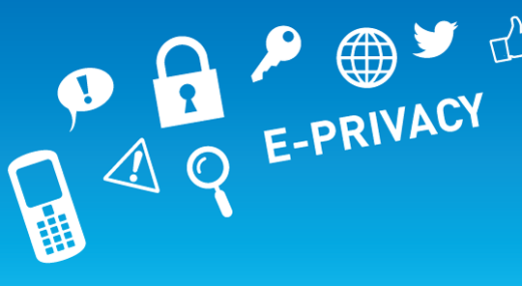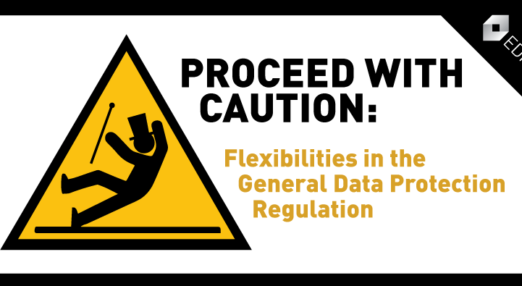Our work
EDRi is the biggest European network defending rights and freedoms online. We work to to challenge private and state actors who abuse their power to control or manipulate the public. We do so by advocating for robust and enforced laws, informing and mobilising people, promoting a healthy and accountable technology market, and building a movement of organisations and individuals committed to digital rights and freedoms in a connected world.
Filter resources
-

Three steps to end freedom of expression
Our right to freedom of expression is laid out in law by the EU Treaties. To ensure democracy and accountability, this fundamental human right may not be restricted unless it is necessary, achieves an objective of general interest and the measure to restrict it is provided for by law.
Read more
-

Alliance for broadband competition sets out benchmarks for EU’s telecommunications update
On 12 July, EU and US telecommunications experts issued a clear warning: to ensure investment in broadband and to give consumers high-speed access to the internet, efficient competition has to be guaranteed. EU policy-makers, academics, civil society and internet providers gathered at #NetCompetition’s high-level forum to lay down the yardstick for the upcoming telecommunications review. […]
Read more
-

Privacy Shield: Privacy sham
Today, on 12 July 2016, the European Commission adopted the so-called “Privacy Shield”, a special arrangement that allows the transfer of personal data from the EU to the United States. The Privacy Shield replaces the former Safe Habor agreement, which used to serve the same purpose, before being annulled by the European Court of Justice […]
Read more
-

Telcos & Commission attack net neutrality and BEREC’s independence
On 7 July 2016, the European Commissioner for Digital Economy and Society Günther H. Oettinger welcomed an attack on net neutrality and the independence of the European Telecom Regulators (BEREC).
Read more
-

UEFA: 1, Right to remix: 0 – Viral video gets blocked
The idea was so simple and yet so genius. After the dramatic Euro 2016 quarter finals between Italy and Germany, the web-artist Kurt Prödel had a wonderful idea: he created a 14-second video, which showed all penalties by the German team simultaneously. In the video, all players are running simultaneously towards the Italian goalkeeper who, […]
Read more
-

Net neutrality – last call for responses to Europe’s biggest ever telecoms consultation
With over 93 000 comments and counting, EU telecom regulators’ consultation on net neutrality has received unprecedented attention from concerned EU citizens. SaveTheInternet.eu is making a final push this week in a bid to reach 100 000 comments. SaveTheInternet.eu, an international coalition of NGOs supporting digital rights in Europe and abroad, is making a last call […]
Read more
-
Save the Internet!
Save the Internet!
Read more
-

Copyfail #7: Not allowing research via “commercial” text and data mining
This article is the seventh in the series presenting Copyfails. The EU is reforming its copyright rules. We want to introduce you to the main failures of the current copyright system, with suggestions on how to fix them. You can find all the Copyfails here. How has it failed? We live in an era where […]
Read more
-

Traffic management: Where are the risks for online discrimination
Net neutrality is the principle that all the internet traffic is treated equally, without blocking or slowing down certain data. Net neutrality is crucial for fair competition between online services, for innovation, and for freedom of expression online. The European Parliament has adopted a Regulation that includes provisions on net neutrality. Currently, the BEREC (the […]
Read more
-

e-Privacy Directive revision: An analysis from the civil society
After the approval of the General Data Protection Regulation (GDPR) and the Data Protection Directive for Law Enforcement Agencies (LEDP), the reform of data protection and privacy in the European Union (EU) now reaches the next step: the review of the e-Privacy Directive (Directive 2002/58/EC on privacy and electronic communications).
Read more
-

PROCEED WITH CAUTION: Flexibilities in the General Data Protection Regulation
We regret that much of the ambition of the original data protection package was lost, due to one of the biggest lobbying campaigns in European history. However, we congratulate the European Parliament — for saving the essence of European data protection legislation.[1] On 14 April 2016, the European Parliament adopted two legal instruments that will regulate […]
Read more
-

Rush to “fight terrorism” threatens our fundamental rights and security
Today, on 4 July 2016, the European Parliament’s Committee on Civil Liberties (LIBE) waved through a compromise text for a Directive on “combating terrorism”. The compromise comes after a series of secret negotiations between a handful of parliamentarians. Our freedoms and security are being threatened by unclear provisions on key issues like internet blocking and […]
Read more
